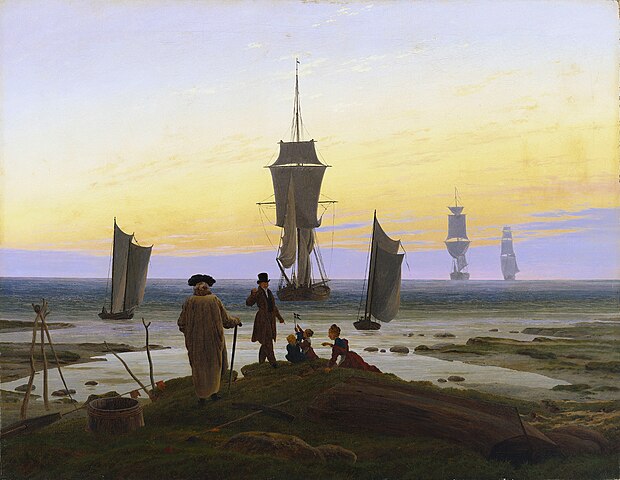
Thammasat University students are cordially invited to an online lecture on Saturday, 24 April 2021 from 3 to 5 pm (Bangkok time) by Assistant Professor Nahum Brown, Ph.D. of Miyazaki International College, a private university in Kiyotake, Miyazaki, Japan.
The subject will be An Introduction to Hegel’s Science of Logic: Being, Nothing, Becoming, and the Project of a Presuppositionless Science.
Students are welcome to register for this event at this link.
Georg Wilhelm Friedrich Hegel was a highly influential German philosopher of the 1800s.
The Thammasat University Library collection includes many books by and about Hegel.
His thinking involved aspects of many fields of study, including psychology, the state, history, art, religion and philosophy.
His ideas about masters and slaves continue to have impact among researchers, especially in Europe.
Among historians influenced by Hegel was Professor Benedict Anderson, whose personal library was donated to the Charnvit Kasetsiri Room of the Pridi Banomyong Library, Tha Prachan campus by Ajarn Charnvit Kasetsiri and Professor Anderson.
Professor Anderson’s book Imagined Communities reminds us that even 200 years ago, Hegel already had thoughts that impact the world of modern media. Professor Anderson evaluates the way Hegel likens the process of opening a newspaper in the morning to religious people who start every day with a prayer. For the first time, in Hegel’s era, people read the morning newspaper over the breakfast table, which was an innovation for mankind:
Each communicant is well aware that the ceremony he performs is being replicated simultaneously by thousands (or millions) of others of whose existence he is confident, yet of whose identity he has not the slightest notion.
The imagined community of the daily newspaper helps build nations, as Benedict Anderson informs us in his reading of Hegel.
The TU library owns copies of Benedict Anderson’s Imagined Communities.

Thailand and Hegel
The presence of Hegel in the Kingdom will be underlined during an International Conference on Hegel’s Philosophy (ICHP) from August 19 to 20, 2021 in Bangkok.
Among topics to be discussed are the following:
- Life, work, and influence of Hegel
- Hegel’s social and political philosophy
- Hegel’s philosophy
- German idealism tradition
- Traditional metaphysical view of Hegel’s philosophy
- Post-Kantian view of Hegel
- The revised metaphysical view of Hegel
- Hegel’s published works
- Phenomenology of spirit
- Science of logic
- Hegel’s encyclopedic system and its expansions
- Philosophy of nature
- Philosophy of subjective and objective spirit
- Philosophy of absolute spirit
- Secondary literature
- Aesthetics and religion in Hegel’s philosophy
- The family
- Civil society
- The state
- Constitutional law
- International law
- World history
Connections between Hegel and the Kingdom began early.
One researcher suggests that Hegel may have been aware of developments in Siam by reading historical accounts first published in the 1600s by such authors as Nicolas Gervaise and Simon de la Loubère.
TU students have heard of Gustave Rolin-Jaequemyns, the Belgian lawyer and diplomat who served as an advisor to King Rama V of Siam (King Chulalongkorn). During his early years, Rolin-Jaequemyns attended classes given by Hegel in Berlin, just as his father, the lawyer Hippolyte Rolin, had done before him.
Later, Rolin-Jaequemyns helped modernize Siam by introducing Western standards at the request of HM Rama V, who granted him the title Chow Phya Abhai Raja, the highest distinction ever given a foreigner.
More recently, TU students may be interested to access through the TU Library Interlibrary Loan (ILL) service a book about Hegel written by a researcher who is based in Chiang Mai.
Hegel and the English Romantic Tradition by Wayne Deakin was published in 2015.
Ajarn Wayne is Senior Lecturer in Literature and English Language at Chiang Mai University.
His doctoral thesis was on Romantic Hermeneutics: Recognition, Hegel, and the English Romantics.
The thesis discusses literature and European philosophy, reflecting an interest in English Romanticism, especially the poets Wordsworth, Coleridge and Shelley.
He has also given public lectures copresented by the History and Philosophy Departments of Chiang Mai University, on Hegel, Marx and Thai History.
A number of other academic researchers in Thailand have discussed Hegel, such as Professor Soraj Hongladarom, professor of philosophy and Director of the Center for Ethics of Science and Technology at Chulalongkorn University.
Ajarn Soraj cited Hegel in his article on How is Thai Philosophy Possible?
In another study, Ajarn Soraj alludes to Hegel’s use of the Greek mythological tradition of the owl of Minerva, a small owl who traditionally accompanies Minerva, the Roman version of the Green goddess of wisdom, named Athena.
The owl of Minerva has been used as a symbol of knowledge, wisdom, and erudition in the Western world.
Hegel’s Philosophy of Right makes an observation about the owl of Minerva.
The TU Library owns English translations of The Philosophy of Right as well as studies about this important philosophical work.
Hegel used the image of the owl of Minerva to point out that just as owls go hunting only after the day is over, in-depth philosophical thinking can only occur after a society is so mature that its day is almost over:
The owl of Minerva spreads its wings only with the coming of the dusk.
Other noteworthy Thai research on Hegel includes an article in the January 2021 issue of Nitiparitat Journal of the Faculty of Law, Chulalongkorn University on Hegel – a critic or a defender of Kantian modernity?
The author is Ajarn Suprawee Asanasak of the Faculty of Law, Thammasat University.
Ajarn Suprawee earned a bachelor’s degree in politics, philosophy and law at King’s College London, followed by a master’s degree at Duke University in the United States of America.
The abstract of her article follows:
The article aims to explain and analyse Georg Wilhelm Friedrich Hegel’s two main critiques on Kantian concept of modernity; the beautiful soul critique and the totalitarian state critique, as well as to provide a concise summary of Hegel’s account on modern state and modern law. The article argues that Hegel’s modernity and the Kantian liberal modernity actually share the same roots, but they have grown apart, and Hegel’s account has extended itself to a rather anti-liberal sphere. However, Hegel’s philosophy cannot be labelled as either pure Kantian liberal or pure authoritarian. His theory should be viewed as a telos which humans aim to achieve and his theory should be used as a standard state to assess our current society.
In a more informal vein, one blogger has observed that although in many ways Thai Theravada Buddhism and Hegel are opposed ways of thinking, both offer useful insights.

(All images courtesy of Wikimedia Commons)
